Interested in learning about the principles that focus on the long-term welfare of the people on the planet? Want to create a better future for those in your community? Coursera has a course that can get you started.
But, like many other online learning platforms, Coursera is brimming with options.
Not to worry, though, we have done a bit of research to help you narrow down your list of potential sustainability courses on Coursera.
If you also want to look at options on other eLearning sites, you can broaden your search on Coursary here.
Table of Contents
Top 6 Sustainability Courses on Coursera
1. Introduction to Sustainability
- Cost: 7-day free trial; free audit; $49 for the whole course
- Duration: +- 25 hours
- Qualification: Certificate of completion
With more than 120,000 students enrolled in the program, Introduction to Sustainability is one of the most popular courses of its kind on Coursera.
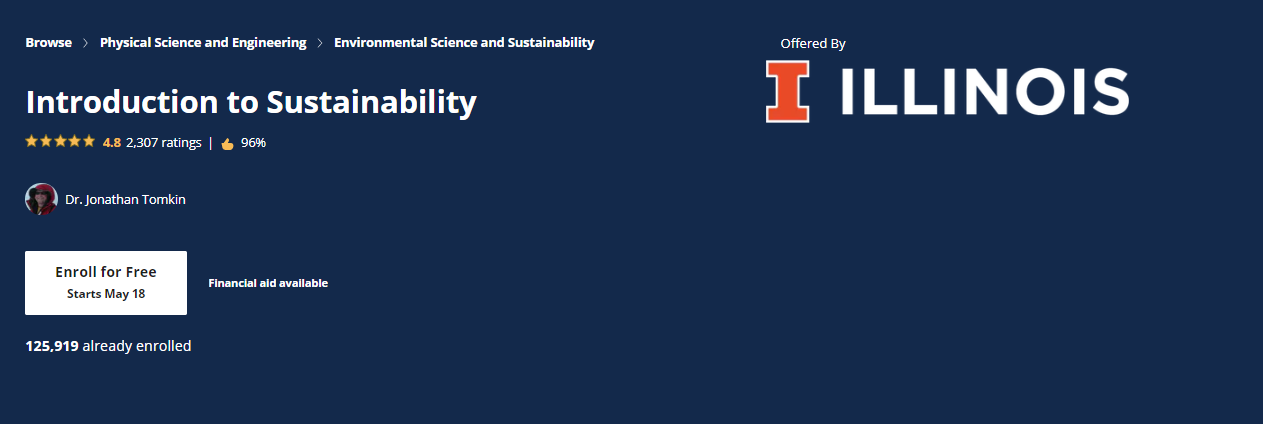
This course introduces an academic approach to sustainability and explores how societies can handle global changes, resource limitations, and ecosystem degradation. It also covers important theoretical and practical concepts, as well as economics, ethics, and cultural history.
Students will work through eight modules across eight weeks. Material-wise, the course is primarly made up of videos, then reading materials, assignments, graded assignments, and quizzes.
Course content can be accessed both online and offline, and because the videos are pre-recorded, students can learn whenever it’s convenient for them.
2. Sustainable Cities and Communities Specialization
- Cost: 7-day free trial; $49 per month for the specialization
- Duration: +-4 months
- Qualification: Certificate of completion
The Sustainable Cities and Communities Specialization tackles the relationship between urbanization, sustainability, and decarbonization.
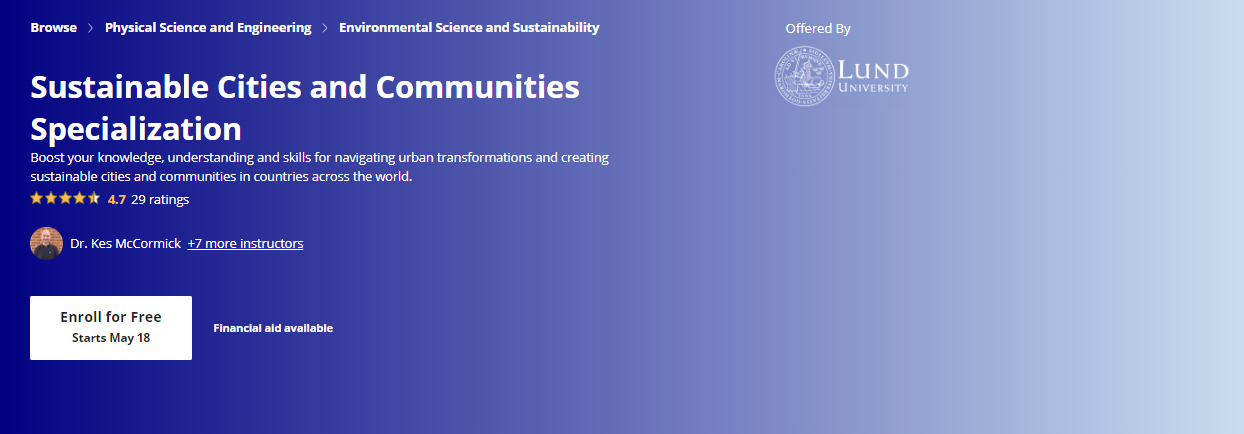
This course is right for anyone who wishes to boost their knowledge on sustainable cities and communities and enhance their critical thinking around the challenges and opportunities in this field.
The content focuses on the role of experimentation, especially the use of urban living labs as tools for catalyzing change in cities and communities.
This specialization consists of three courses, including Greening the Economy, Urban Nature, and Cities and Consumption.
Each course is divided into specific topics, and each topic features pre-recorded videos, reading materials, and quizzes. There are also hands-on projects and graded assignments. The students who complete all tasks successfully get a shareable certificate upon completion.
3. Become a Sustainable Business Change Agent Specialization
- Cost: Free 7-day trial; $39 per month after the trial
- Duration: +-5 months
- Qualification: Certificate of completion
This Coursera specialization is aimed at professionals who wish to enhance the way their organization or company impacts the world around them.
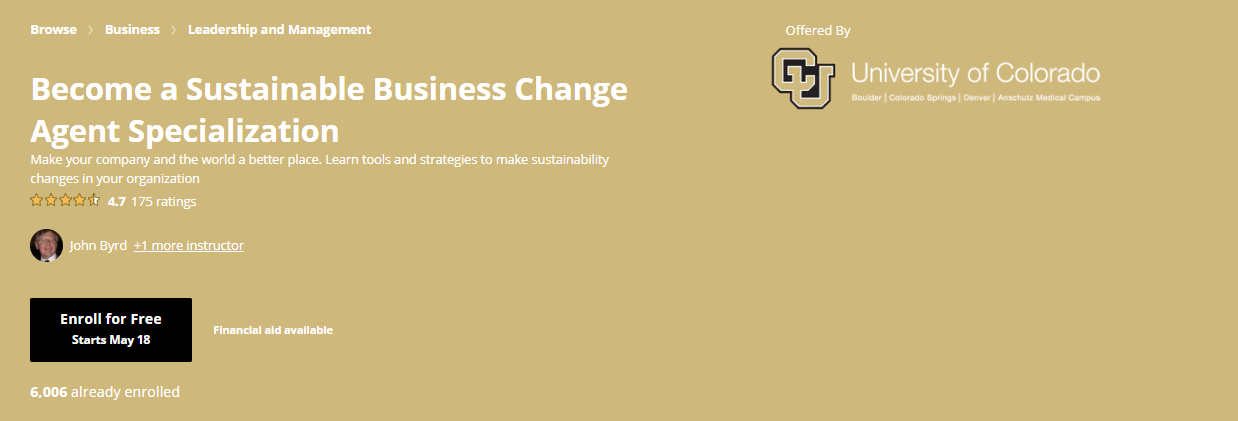
The course teaches critical elements of sustainable businesses and how to be a successful change agent. The goal is to transfer skills needed for effective sustainability proposals and convincing stakeholders to make a change.
This specialization consists of four courses, including Making a Case for Business Sustainability, Change and Sustainability, Sustainable Business Issues and Changes, and Creating a Sustainable Proposal.
There’s a hands-on project that you have to complete in order to receive a certificate at the end. Each course also features quizzes, graded assignments, and plenty of reading material. You can access all course content via your smartphone or desktop.
4. Groundwater Contaminants: New Paradigms, Technologies, and Applications
- Cost: Free audit; $5 for the whole course
- Duration: +-28 hours
- Qualification: Certificate of completion
Coursera’s only advanced-level course tackles the complex environmental challenge of cleaning up groundwater contamination sites worldwide.
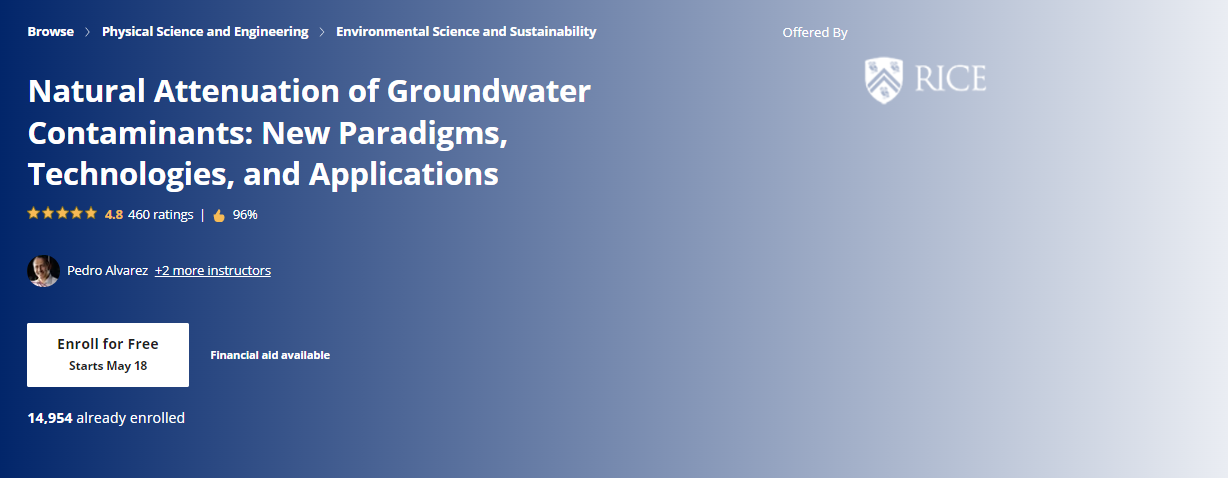
This course is ideal for environmental remediation professionals who wish to enhance their knowledge of Monitored Natural Attenuation (MNA) as an implementation solution for groundwater contamination plume treatment.
Each module has around 40 minutes of video lectures, reading assignments, and quizzes. A shareable certificate is available to students who complete all graded assignments throughout the course.
You can follow your own pace as all content is either pre-recorded or in written form, and there are no deadlines for project completion.
5. Ecosystem Services: A Method for Sustainable Development
- Cost: Without certificate – free; With certificate – $49
- Duration: +-18 hours
- Qualification: Certificate of completion
Geneva University offers one of Coursera’s most detailed courses on ecosystem services as a way of evaluating and thinking about natural goods and services that enhance people’s well-being.
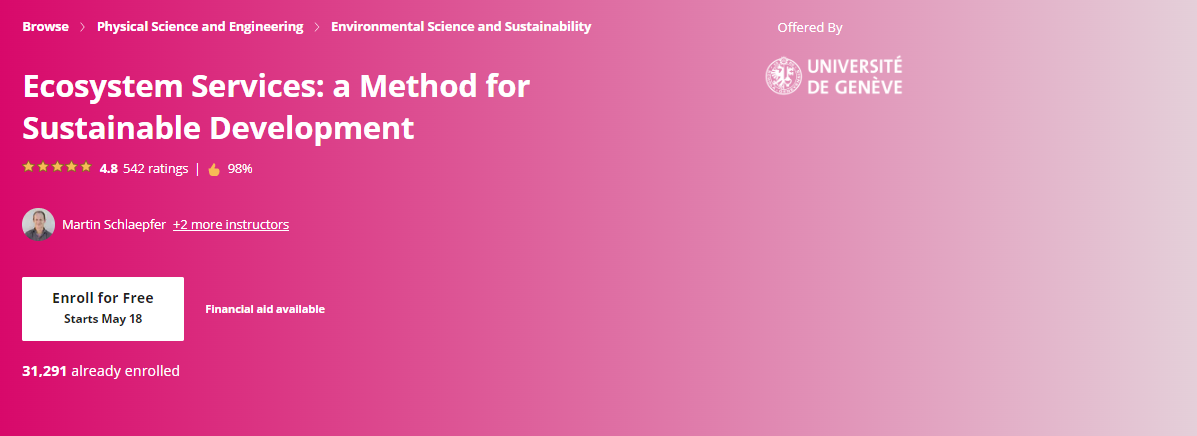
The course touches on scientific, socio-political, and economic concepts through case studies, theory, and interviews.
By the end of the course, students will be able to understand ecosystem principles and limitations, services associated with fresh water and other resources, learn about the risks and advantages of ecosystem service monetization, and much more.
Besides the pre-recorded video classes, the course also consists of reading assignments and quizzes. Students who complete all tasks by the end of the course will receive a shareable certificate.
6. The Age of Sustainable Development
- Cost: Free
- Duration: +-30 hours
- Qualification: None
Students looking to gain insights into the pathways and challenges associated with sustainable development shouldn’t skip this course.

The program focuses on socially and environmentally inclusive economic development and can be useful for both students and professionals from the environmental sector.
The course also builds on urban planning and sustainable energy skills.
Students can access the learning material anytime and anywhere, and the same goes for submitting assignments. There are no deadlines for completing the course. At the time of writing, this course didn’t have a certificate option, meaning that you can access the content for free as long as you need to.
Are Coursera Courses Worth It?
Coursera is one of the best platforms for learning online at your own pace. Most of the sustainability courses (except for one) mentioned above offer shareable certificates of completion that you can upload to your LinkedIn profile or place in your CV for future employers to see.
Given that most courses are created by top-line companies and universities, the certificates certainly hold value.
However, if you’re after professional recommendations or looking for a college degree in sustainability, know that Coursera currently doesn’t offer such programs.
For more on this platform in general, you can read our detailed Coursera review here.
What to Expect from a Career in Sustainability
If you’re considering shifting to a career in sustainability you’re headed in a fulfilling direction.
More companies have begun to respond to consumer demands to focus on environmentally friendly practices in almost every sector.
For many sustainability managers (one of many roles you can assume in this field), every working day is different.
You may travel to different sites, work on different projects, and attend conferences, calls, and seminars regularly. You’ll also be dealing with people from different backgrounds, from installers and designers, to end clients, and consultants.

To succeed in sustainability, you need to have some key skills:
- Foundational knowledge. It’s essential to understand sustainable practices before being able to implement them in your company. It’s also important to get acquainted with prevalent social issues in your industry and community.
- Leadership. Leadership is an important skill for all sustainability employees, especially those whose organizations still haven’t taken the sustainability leap. You need to learn how to delegate tasks, maintain team resilience, communicate organizational changes, and stay authentic.
- Identifying strategic opportunities. Once you understand sustainable business practices, you’ll also start noticing opportunities and make meaningful changes within your society and business.
- Problem-solving. Sustainability comes down to problem-solving most of the time. You’ll be dealing with new, complex challenges that can make it easy to get stuck in the way your business is used to operating. However, to be successful in sustainability practices, you need to be able to think critically and bring innovative ideas to the table.
According to Glassdoor’s April 2022 data, sustainability managers in the U.S. earn a median salary of $85,785 per year, with additional pay of around $14,100 per year. This is way more than the median annual salary.
Conclusion
Anyone looking for online courses on sustainability can find plenty of great options on Coursera. The online learning platform has plenty of opportunities for beginners and intermediate learners, so if you fall in to any of these categories, give it a try.
Advanced learners or those who already have years of experience in the field may be better off checking out some Coursera alternatives.
Regardless of where you are in your sustainability career, it’s important to work on improving your skills and staying on track with current trends and practices.
